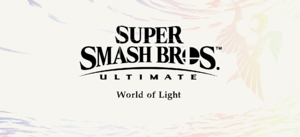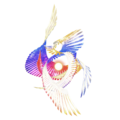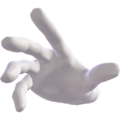Adventure Mode: World of Light: Difference between revisions
| Line 36: | Line 36: | ||
**One scene shows a shadowy object disappear in a burst of light, followed by a nearby crystal shattering. The significance of this is currently unknown. | **One scene shows a shadowy object disappear in a burst of light, followed by a nearby crystal shattering. The significance of this is currently unknown. | ||
**Numerous drawn elements on the map heavily reference various ''Smash'' [[universe]]s. One building in particular resembles [[Nintendo]]'s headquarters in Kyoto, Japan. | **Numerous drawn elements on the map heavily reference various ''Smash'' [[universe]]s. One building in particular resembles [[Nintendo]]'s headquarters in Kyoto, Japan. | ||
*The mode contains three endings in total; two of which are bad endings and one being considered the true ending. Initially, the player is given a choice to fight either [[Galeem]] or [[Dharkon]], depending on the tree of levels the player chooses; if the player chooses a path that leads to Galeem or Dharkon, this gives one of the two bad endings, depicting the surviving antagonist disposing of the defeated one and consuming the world. If the player chooses a tree of levels that does not lean too far towards either antagonist, the player is given the ability to play as [[Master Hand]] himself, engaging in a [[Mob Smash]]-esque match where it defeats 50 enemies similar to [[False character]]s from the [[Subspace Emissary]]. Although some are colored light blue (Galeem's clones) while others are dark red (Dharkon's clones), both are required to be KOed. If this level is completed successfully, the player is now given the option to fight ''both'' Galeem and Dharkhon simultaneously. | *The mode contains three endings in total; two of which are bad endings and one being considered the true ending. Initially, the player is given a choice to fight either [[Galeem]] or [[Dharkon]], depending on the tree of levels the player chooses; if the player chooses a path that leads to Galeem or Dharkon, this gives one of the two bad endings, depicting the surviving antagonist disposing of the defeated one and consuming the world. If the player chooses a tree of levels that does not lean too far towards either antagonist, [[Master Hand]] and [[Crazy Hand]] help the player advance; the latter creating a giant rift for the former to enter. Thus, the player is given the ability to play as [[Master Hand]] himself, engaging in a [[Mob Smash]]-esque match where it defeats 50 enemies similar to [[False character]]s from the [[Subspace Emissary]]. Although some are colored light blue (Galeem's clones) while others are dark red (Dharkon's clones), both are required to be KOed. If this level is completed successfully, the player is now given the option to fight ''both'' Galeem and Dharkhon simultaneously. | ||
===Unconfirmed elements=== | ===Unconfirmed elements=== | ||
Revision as of 05:19, November 29, 2018
| World of Light | |
|---|---|
 The World of Light logo. |
Adventure Mode: World of Light (灯火の星, The Star of Light) is a single-player mode in Super Smash Bros. Ultimate, and the successor to the Adventure Modes in Melee and Brawl. The mode is accessed from the Spirits main menu item and revolves around the fighters teaming up with Spirits to defeat an "ultimate enemy" named Galeem.
Elements
- At the beginning of the mode, a cutscene shows all the fighters except Kirby being defeated by Galeem, followed by the World of Light logo. A second cutscene then shows the fighters being used as molds to create puppets inhabited by spirits. Afterward the game transitions to the world map, with Kirby, the only available fighter, at the starting point.
- Similar to The Subspace Emissary, the mode features a world map that may be navigated. Map navigation is unlike The Subspace Emissary but somewhat resembles Smash 3DS's Classic Mode: the player character has a fully rendered model on the map, and the character themselves (rather than the player) navigate on predetermined paths between map locations. Galeem appears at the top center of the map, surrounded by what appears to be a forcefield.
- Both spirits and fighters appear on the map as rendered icons, with one type of icon for spirits and one type for fighters. Moving up to and interacting with an icon will reveal which character it is. Opponent fighters (including fighters that represent spirits) appear with distinctive red eyes both on the map and in battle.
- Defeating an opponent spirit obtains that spirit, and may (but not always) reward the player like in a Spirit Battle, with G, SP, and snacks. Unlike a Spirit Battle, the player may also be rewarded with Skill Spheres. In one piece of footage, an item labeled Health Drain with unknown significance appears on the reward screen.
- Defeating an opponent fighter (not representing a spirit) unlocks that fighter both in the mode and in the main game. The player may swap to any unlocked fighter through the mode's menu. Uniquely, this is the only way to see the character selection screen with fewer than the starter characters.
- Items and obstacles appear on the map, including:
- Treasure chests (resembling those found in Crazy Orders)
- A waterfall that is swum through by interacting with it
- A red ! Switch that vanishes when stepped on, transforming a row of Dotted Line Blocks on the map into a bridge of red ! Blocks over lava. The same scene also shows golden ! Blocks, Donut Blocks, and a Warp Pipe.
- Diamond-shaped objects that teleport the player character to a nearby identical teleporter
- At least three buildings labeled with the Primary Spirit symbol
- Various drawn elements that resemble cave entrances and roadblocks
- Some type of minigame system appears to be present:
- In one map, the player character collects Food items by moving through them, adding to a counter in the bottom right of the screen. The counter is not seen anytime else.
- In another map, the player character uses a Zapfish on some type of machine to cause it to emit electricity, decreasing a similar counter in the bottom right of the screen.
- Bosses are present, but in a few different ways:
- Rathalos is shown flying next to a treasure chest.
- Master Hand appears to have some kind of role in creating obstacles for the player: after the player chooses between the previously mentioned Marth, Sheik, and Villager to unlock, he creates two forcefields that block off the paths to the other fighters. In another scene, he destroys a bridge over a river.
- Galleom does not appear as a rendered model on the map like the previous two, but instead appears as a larger version of the icon used for spirits.
- The player may zoom out to view the full map by pressing the L button. Areas not yet visited are obscured with clouds.
- When fully zoomed out, the player character's model is replaced with their stock icon, opponent fighter icons similarly become flat, and various other icons appear on the map. Spirit icons do not appear on the zoomed-out map. In addition, the predetermined paths between map areas become explicitly drawn. Certain paths are drawn with dotted lines; what this means is currently unknown. The other icons resemble a "no entry" sign, different-colored Warp Pipes, a switch with an exclamation point, some type of building, and an unknown swirl-shaped symbol.
- Some type of non-planar world map travel appears possible, as the zoomed-out map shows two disconnected areas that have been accessed.
- When fully zoomed out, the player character's model is replaced with their stock icon, opponent fighter icons similarly become flat, and various other icons appear on the map. Spirit icons do not appear on the zoomed-out map. In addition, the predetermined paths between map areas become explicitly drawn. Certain paths are drawn with dotted lines; what this means is currently unknown. The other icons resemble a "no entry" sign, different-colored Warp Pipes, a switch with an exclamation point, some type of building, and an unknown swirl-shaped symbol.
- At least three sub-maps may exist, as these screens show the Back and Menu options but no Full Map option. (In all other scenes, all three options slide off and on the screen together.)
- Certain other means of transportation are seemingly available, as one clip shows Pokémon Trainer use Lapras to traverse a body of water, while another clip shows the Great Fox traveling through a part of the world map resembling outer space. The bus belonging to Kapp'n also appears parked near a sign drawn on the map labeled "bus stop", and the front car of the Spirit Train appears on some train tracks.
- One scene shows a shadowy object disappear in a burst of light, followed by a nearby crystal shattering. The significance of this is currently unknown.
- Numerous drawn elements on the map heavily reference various Smash universes. One building in particular resembles Nintendo's headquarters in Kyoto, Japan.
- Both spirits and fighters appear on the map as rendered icons, with one type of icon for spirits and one type for fighters. Moving up to and interacting with an icon will reveal which character it is. Opponent fighters (including fighters that represent spirits) appear with distinctive red eyes both on the map and in battle.
- The mode contains three endings in total; two of which are bad endings and one being considered the true ending. Initially, the player is given a choice to fight either Galeem or Dharkon, depending on the tree of levels the player chooses; if the player chooses a path that leads to Galeem or Dharkon, this gives one of the two bad endings, depicting the surviving antagonist disposing of the defeated one and consuming the world. If the player chooses a tree of levels that does not lean too far towards either antagonist, Master Hand and Crazy Hand help the player advance; the latter creating a giant rift for the former to enter. Thus, the player is given the ability to play as Master Hand himself, engaging in a Mob Smash-esque match where it defeats 50 enemies similar to False characters from the Subspace Emissary. Although some are colored light blue (Galeem's clones) while others are dark red (Dharkon's clones), both are required to be KOed. If this level is completed successfully, the player is now given the option to fight both Galeem and Dharkhon simultaneously.
Unconfirmed elements
- When this mode is highlighted from the Spirits menu, the artwork on the left side of the screen depicts Galeem, Rathalos, the Werewolf, Balder/the Masked Lumen, and King Bulblin. This context implies that the latter three will have some sort of opponent presence in the mode (if not as a boss).
Skill Tree
The Skill Tree is a menu item in World of Light. In it, the player can spend Skill Spheres (スキルのかけら Skill Fragments) in order to learn Adventure Skills. These are effectively power-ups, and appear as icons resembling the stat boost icons found in Smash 4's Smash Tour and Smash Run. Obtaining a power-up also makes power-ups further down the tree available. The player can spend SP to forget a power-up and gain back all of the Skill Spheres spent on it.
Unlockables
Characters may be unlocked through this mode. Playing this mode is required to unlock the ability to train spirits in the dojo or have them explore for treasure.
Plot
Trailer
<youtube>WShCN-AYHqA</youtube>
Gallery
Trivia
- If World of Light's Japanese name has its characters reversed, it can be read as 星の火灯, which is pronounced very similarly to 星のカービィ (Kirby of the Stars), the Japanese name of the Kirby series. Sakurai has stated however, that this was coincidental.[1]
- The cliff appearing at the start of World of Light's reveal trailer is a reference to the opening cutscene from Brawl and the cliff overlooking the Isle of the Ancients and is even used borderline identically, showing all the fighters before changing perspective to look over a sunrise/sunset and an ocean.
- Also in the reveal trailer, the location where Kirby's Warp Star crash-lands strongly resembles the cliffs used in the reveal trailers for Mega Man, Greninja, and Bowser Jr. prior to the release of Super Smash Bros. 4. This cliff area is further shown to overlook the area in the background of Battlefield.
- The premise of World of Light is identical to an idea that Masahiro Sakurai considered for The Subspace Emissary in Brawl. He had initially envisioned a story in which a single character survives the annihilation of their squadron and must fight back while rounding up his allies.[2] In World of Light, Kirby is this sole survivor.
- According to Sakurai, the reason Kirby was chosen as the sole starting character in World of Light was because he was one of the few characters who could plausibly escape Galeem's attack (the others being Bayonetta and Palutena, although it contradicted the fact spirits of similar powers did not survive), but was also the most suitable as an introductory character.[1]
References
- ^ a b Source Gaming - Sakurai Discusses the World of Light and Smash Ultimate
- ^ "Iwata Asks - Super Smash Bros. Brawl" "I had envisioned a more serious tone for the story. Something with some misfortune like a single character escaping total annihilation of his squadron and then fighting back while rounding up his allies."


